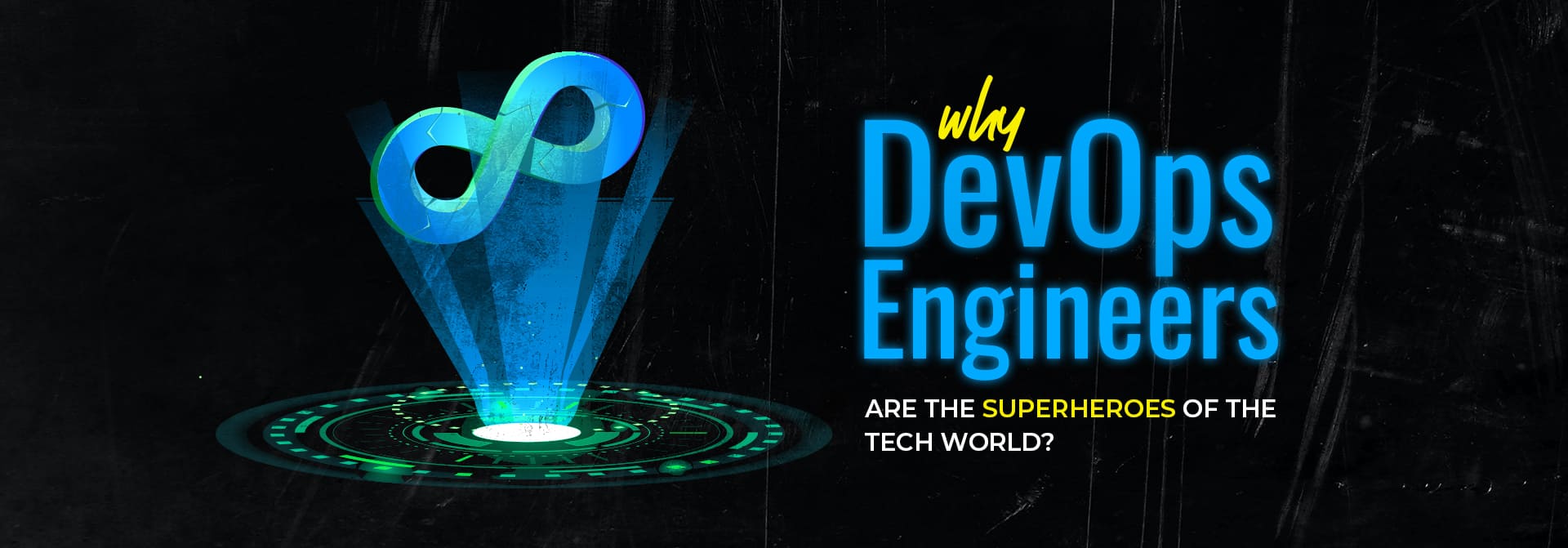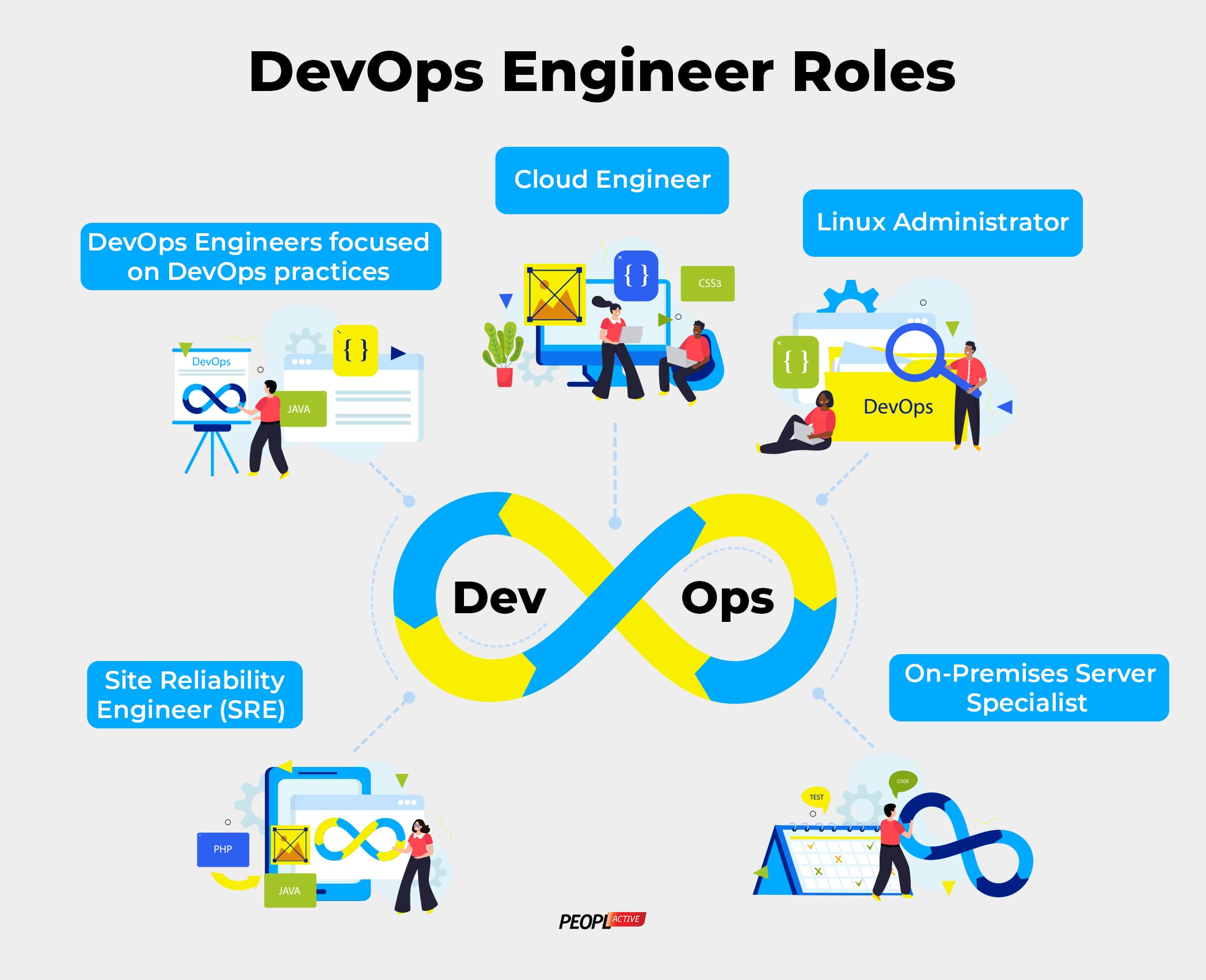
Have you ever wondered how your favorite superhero manages to swoop in at the right moment, saving the day with a flick of their cape? In the ever-transforming realm of technology, a different kind of superhero is quietly donning their digital cape and making equally astonishing feats possible. They’re known as DevOps engineers and the true unsung champions of the tech world.
Let’s dive deep into why DevOps engineers can be considered the superheroes of the tech world.
Also Read: How DevOps Engineers Help Improve Business Efficiency
Table of Contents
ToggleWho is a DevOps Engineer?
A DevOps Engineer is a versatile professional who acts as a bridge between software development and IT operations teams. This role demands a deep understanding of both disciplines and an unwavering commitment to fostering a collaborative culture. DevOps engineers combine technical prowess with communication skills to create an environment where efficiency, agility, and continuous improvement thrive.
When is the right time to hire DevOps Engineers
Principal Duties and Responsibilities of a DevOps Developers
As you consider the decision to hire DevOps developers, it’s crucial to understand the core responsibilities that come with this role. DevOps developers play a pivotal role in bridging the gap between software development and IT operations, fostering a culture of collaboration and continuous improvement.
Here are the primary duties that DevOps developers undertake:
- Designing and Implementing CI/CD Pipelines
DevOps engineers are architects of continuous integration and deployment (CI/CD) pipelines. They design and implement automated workflows that facilitate the smooth integration of code changes, automated testing, and rapid deployment. Establishing these pipelines ensures that new features and updates can be delivered to end-users quickly and reliably.
- Configuration Management
Configuring and managing infrastructure efficiently is a core responsibility of DevOps engineers. Using tools such as Ansible, Puppet, or Chef, they maintain consistency across various environments, ensuring the software runs reliably across development, testing, and production environments.
- Infrastructure as Code (IaC)
DevOps engineers utilize Infrastructure as Code (IaC) principles to script and define infrastructure using tools like Terraform. This approach enables them to programmatically provide and manage infrastructure resources, reducing manual intervention and minimizing configuration errors.
- Monitoring and Problem-solving
Implementing robust monitoring and alerting systems is crucial for DevOps engineers. They set up real-time monitoring tools to track the performance and health of applications and systems. This proactive approach allows them to identify potential bottlenecks or issues early and address them before they impact users.
- Security Integration
Security is a top priority, and DevOps engineers collaborate closely with security teams to integrate security measures into the development pipeline. They ensure that security practices, vulnerability assessments, and compliance checks are integrated throughout the software development lifecycle.
- Collaboration and Communication
DevOps engineers serve as bridges between development and operations teams. They facilitate effective communication, collaboration, and shared responsibility. Breaking down silos creates an environment where both groups work together seamlessly to achieve common goals.
- Continuous Learning and Improvement
Staying up to date with evolving technologies and practices is essential for DevOps engineers. They are committed to continuous learning, experimenting with new tools and methodologies to optimize processes and enhance efficiency.
- Performance Optimization
DevOps engineers identify performance bottlenecks and optimize system resources for optimal efficiency. This involves tuning configurations, optimizing database queries, and ensuring that applications can handle the expected load without compromising performance.
- Disaster Recovery and Business Continuity
Ensuring business continuity is a critical responsibility. DevOps engineers plan and implement disaster recovery strategies to minimize downtime and data loss in case of unexpected events, ensuring the availability and reliability of services.
- Cloud Management
With the prevalence of cloud computing, DevOps engineers manage cloud resources efficiently. The provision, configure, and work cloud-based services to ensure scalability, elasticity, and cost-effectiveness.
- Documentation and Knowledge Sharing
DevOps engineers create and maintain documentation to ensure that processes, configurations, and best practices are well-documented and accessible to the team. This knowledge-sharing fosters a collaborative environment and reduces the learning curve for new team members.
As you seek to hire DevOps developers, understanding their core duties and responsibilities is crucial. Their expertise in automation, collaboration, and optimization contributes significantly to the efficiency, reliability, and success of software development and operations.

DevOps Engineer Roles: Navigating the Multifaceted Landscape
DevOps engineers are the unsung heroes of modern technology, orchestrating the harmony between development and operations to deliver seamless software solutions. They wear several hats within this realm, each reflecting a distinct focus and expertise. Let’s explore the various roles that DevOps engineers can embody:
- DevOps Practices Enthusiast
At the core of DevOps engineering lies a commitment to practices that streamline software development and delivery. DevOps engineers champion the integration of development and operations, enabling continuous integration, delivery, and automated testing. Their expertise in tools like Jenkins, GitLab CI/CD, and Travis CI allows them to create pipelines that ensure code changes are efficiently integrated, tested, and deployed, ultimately leading to faster and more reliable software releases.
- Cloud Engineer: Mastering Cloud Administration
A DevOps engineer with a cloud specialization optimizes cloud infrastructure and services. They have become proficient in cloud platforms like Amazon Web Services (AWS), Microsoft Azure, Google Cloud Platform (GCP), and Digital Ocean. Their expertise includes provisioning and scaling cloud resources, managing containers using Kubernetes, and leveraging serverless technologies. This role ensures that applications are well-architected, highly available, and seamlessly adapt to changing demands.
- Linux Administrator: Guardians of the Open-Source Realm
Open-source services form the backbone of many software systems, and DevOps engineers often take on the role of Linux administrators. These individuals manage and maintain Linux servers, ensuring optimal performance, security, and availability. They configure services such as web servers, databases, and other software components, all while troubleshooting server issues and maintaining system stability.
- On-Premises Server Specialist: Bridging the Physical and Virtual
While cloud technologies dominate discussions, on-premises infrastructure remains critical for many organizations. DevOps engineers focusing on on-premises servers excel in managing physical data centers and virtual environments. They possess expertise in platforms like VMware, Microsoft Hyper-V, and Proxmox. Maintaining these environments ensures efficient resource utilization, seamless virtualization, and a solid foundation for various workloads.
- Site Reliability Engineer (SRE): Crafting Resilient Systems
The Site Reliability Engineer (SRE) role encompasses software engineering and system administration. SREs focus on enhancing the reliability and availability of production systems. They meticulously monitor and manage Linux servers, implement proactive measures to prevent incidents and conduct Root Cause Analysis (RCA) to understand and address any issues. SREs also respond to on-call incidents, ensuring the systems are resilient, performant, and responsive to user demands.

Why Should You Hire DevOps Engineers?
The decision to hire DevOps engineers is not merely a hiring choice, but a strategic move that can significantly impact your organization’s efficiency, agility, and overall success.
Check out some compelling reasons why you should hire DevOps Programmers:
- Accelerated Development Lifecycle
DevOps engineers streamline the software development lifecycle through automation, reducing manual intervention and enabling rapid testing and deployment. This translates to quicker time-to-market for products and features.
- Improved Collaboration
DevOps engineers promote efficient communication and shared responsibility by fostering collaboration between development and operations teams. This leads to fewer misunderstandings, faster issue resolution, and a more cohesive work environment.
- Enhanced Reliability
DevOps practices emphasize continuous monitoring, testing, and feedback. This proactive approach helps identify and rectify potential issues before they affect users, ensuring a reliable and stable software environment.
- Scalability and Flexibility
DevOps engineers design systems that can seamlessly scale to accommodate increased user demand. This scalability ensures that your applications can handle expected and unexpected traffic spikes without compromising performance.
- Security and Compliance
With a focus on integrating security throughout the development process, DevOps engineers help safeguard your applications and data. They work closely with security teams to implement best practices and ensure compliance with industry regulations.
The decision to hire DevOps engineers is an investment that reaps multiple benefits, spanning from accelerated development cycles to enhanced collaboration and security. These professionals drive operational excellence, enabling your organization to navigate the complexities of modern software development and IT operations with confidence. Embrace the DevOps paradigm and unlock the full potential of your team’s capabilities.
Also Read: Top Strategies to Advance Your DevOps Game in 2023
Wrapping it up!
Are you convinced of the remarkable influence DevOps engineers hold in shaping the tech landscape? Their ability to seamlessly bridge gaps, automate processes, enhance security, and foster innovation makes them the linchpin of modern technology.
Now, imagine having the right DevOps engineer who perfectly fits your team’s needs. That’s where PeoplActive DevOps hiring services come in. With our expertise in identifying and evaluating top-tier talent, we simplify the complex task of finding your ideal DevOps professional. By partnering with us, you position your organization to harness the full potential of DevOps.
DevOps engineers are the driving force behind tech excellence, and PeoplActive DevOps hiring services offer you the key to unlock their transformative abilities. Don’t just keep up with the tech evolution – lead it, with DevOps at your side.
Looking to Hire DevOps Developers?




